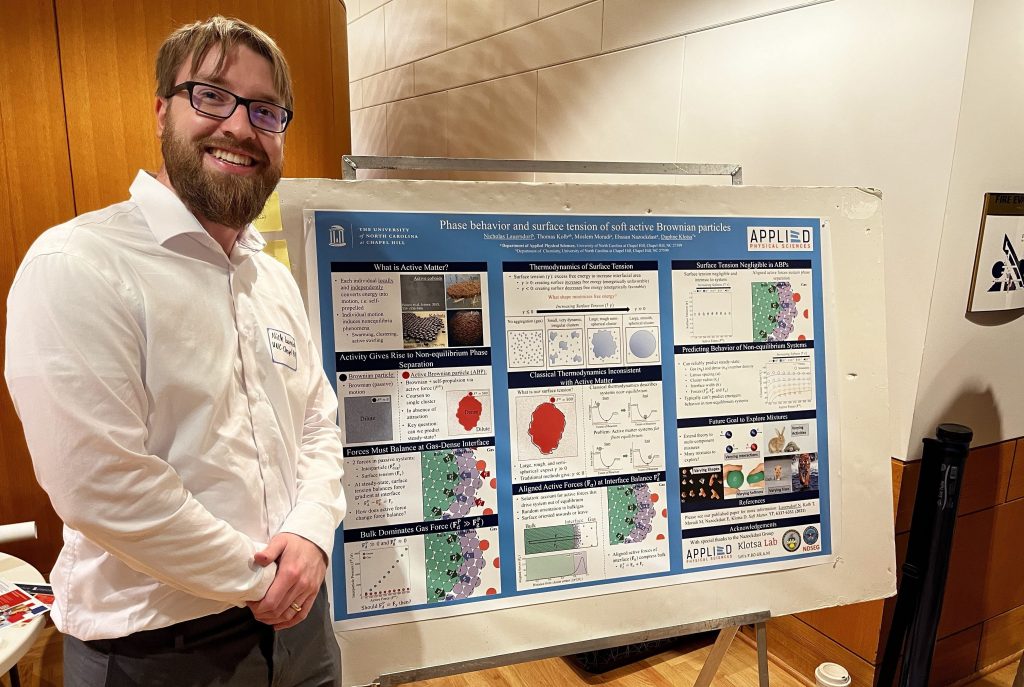
Nick Lauersdorf is among a highly prestigious group of graduate students selected for the National Defense Science and Engineering Graduate (NDSEG) Fellowship Program. The three-year fellowship provides funding for research, conferences, and opportunities for career development while honing Lauersdorf’s technical skills like machine learning and data science. Funded by the Department of Defense (DoD), NDSEG accepts less than 2% of all applicants annually, making Lauersdorf one of 159 fellows in his cohort across all divisions of the armed forces.
“This fellowship provides me with the freedom to expand my familiarity with other research and technical skills,” Lauersdorf explains. “Instead of relying solely on very narrow research to develop my programming knowledge, this real-world experience exposes me to a diverse array of technical skills that are critical to prepare for the job market.”
Lauersdorf, a materials science Ph.D. candidate in associate professor Daphne Klotsa’s research group in the department of applied physical sciences (APS), focuses on a relatively new field of research: active matter. Active matter consists of self-propelled individuals, such as humans walking, fish swimming, or colloids propelling from chemical reactions. Activity enables these individuals to come together, interact, and act collectively: humans form crowds, fish form schools, and active colloids phase separate into a dense cluster and a dilute gas. However, activity continuously drives the system out of rest (equilibrium), making it a challenge to understand and predict system behaviors. Lauersdorf’s research goal is to increase fundamental understanding of active matter through computation to enhance the design of experimental systems and applications.
“Current research predominantly relies on every individual within a system behaving exactly the same, but in nature this is not necessarily true,” he says. “Active mixtures describe systems where multiple species interact differently, which can give rise to emergent collective behavior within a system, such as a dog herding sheep. I am extending our fundamental knowledge of collective behavior to more realistic, diverse systems.”
Lauersdorf explains that there are conventional uses as well as potential military applications that may arise from his research. “By studying active matter, we can better understand crowd dynamics – particularly to find solutions to mitigate damage in events that may be dangerous to people, such as preventing crushing and suffocation in dense crowds like what happened at the recent Travis Scott concert,” he says.
Regarding military applications, an understanding of active matter may be used for technology that utilizes swarms of robotic drones that interact with each other to collectively achieve a given objective. “The long-term goal for military use is to reduce user error, increase efficiency, and improve accuracy in drone-swarm technology. Drone-swarms are currently used to map areas as well as search and rescue efforts, and we hope to improve efficiency in achieving these time-sensitive objectives,” Lauersdorf explains.
In addition to funding his research, NDSEG has enabled Lauersdorf to attend several conferences and seminars funded by NDSEG. “Attending conferences is a valuable way to learn new science and to find collaborators and meet new people,” he says. “I recently traveled to Chicago for the American Physical Society March Meeting and will attend the NDSEG conference this summer in San Antonio to present my research and network with government lab personnel to identify future career opportunities after graduate school. ”
Lauersdorf initially learned about this opportunity via UNC’s Graduate Funding Information Center and decided to apply with the support of senior graduate students and his advisor within APS.
Lauersdorf notes the overlap and value of his fellowship in conjunction with his coursework. “The materials science doctoral curriculum helps to develop professional skills, including management and networking strategies, and technical skills, such as programming,” he explains. “I can further develop my professional and technical skills by the real-world experience supported by my NDSEG fellowship.”
After his anticipated graduation in spring 2024, Lauersdorf hopes to continue defense-related research in a professional capacity. However, he notes that he is “keeping [his] options open and would be interested in pursuing data science and potentially become a manager in the technology sector.”
By Sarah Auerbach, Department of Applied Physical Sciences
